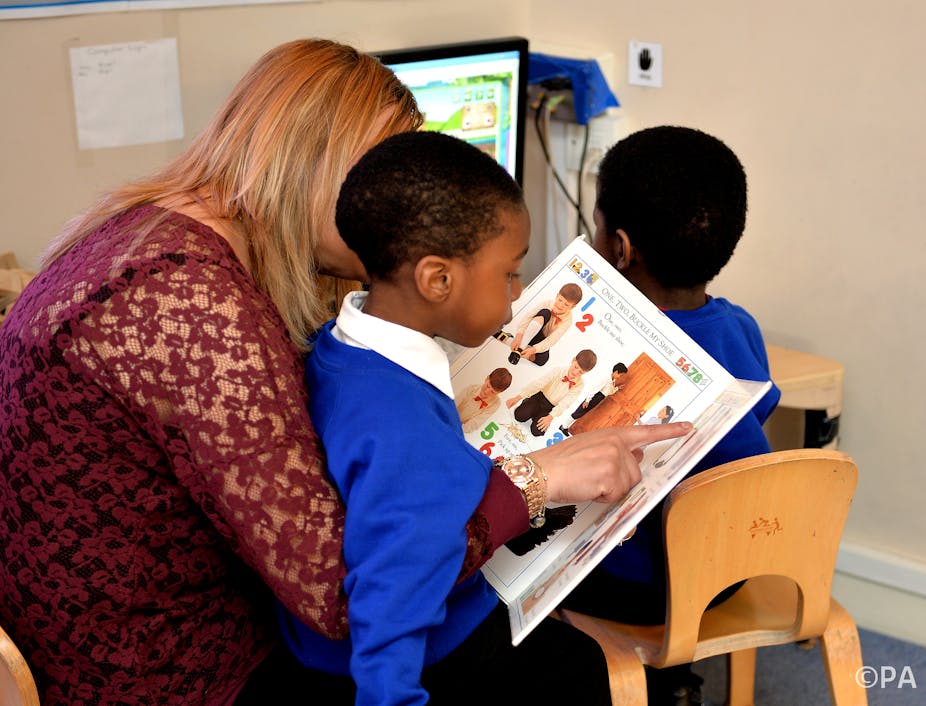All children deserve a good start in life, and we know that high quality early years provision can help to support children’s development. Research shows that it is particularly beneficial for disadvantaged children, who are at risk of falling behind their better-off peers.
Our most recent study, funded by the Nuffield Foundation, suggests that disadvantaged preschoolers attending private and voluntary (non-profit) nurseries and preschools may be losing out because quality is lower in deprived areas. In state-maintained schools there is no “quality gap”, and we think that the differences may lie in the qualifications of the staff.
Measuring quality
We analysed data on more than 1,000 nurseries, preschools, nursery schools and primary schools in England, using information on quality for three and four-year-olds collected using the research-validated Environment Rating Scales. These measure many different aspects of quality, including the physical environment, equipment and toys, the quality of care routines, and how effectively staff support children’s language and learning.
We compared the quality of early years providers serving disadvantaged areas and children, and those catering for the more advantaged.
What we found within the private and voluntary sector was worrying. Not only was quality in nurseries and preschools lower in deprived areas, but it was lower in the areas we know to be most important for children’s development. The “quality gap” between settings catering for the least and the most deprived areas was widest when it came to the quality of support for language skills (a 9% gap).
Adult support for language development is particularly important for disadvantaged children, who research shows are already almost a year behind those from wealthier backgrounds in terms of their vocabulary by the age of five.
Language skills during the early years are one of the strongest predictors of later success. But our analysis suggests that the children most in need of good quality support for language development are actually the least likely to receive it. These children are doubly disadvantaged: first of all by their circumstances and then by the quality of early years provision they receive.
School provision more equal
Things were different in the state-maintained sector. In schools, quality for three-and four-year-olds was equally as good and sometimes even better in disadvantaged areas.
So how is it that schools are able to provide good quality for disadvantaged children while the private and voluntary sector struggles to? We think that a large part of the answer lies in the quality of the staff. Whereas all school classes are led by a qualified teacher, less than half of private and voluntary nurseries employ a graduate, and only 8% have more than one.
We found that among private and voluntary providers with a graduate on the staff, the tendency for quality to be lower in deprived areas was much less evident.
This makes intuitive sense. It is not hard to make the link between specialised and high-level training and the ability to provide good quality language support for children who are more likely to be behind in their language development. A more pressing question is what can be done about it: how do we improve quality in disadvantaged areas?
Employ graduates
The obvious implication of our research is that staff qualifications matter, and that they matter most for disadvantaged children. We have recommended government support for increasing the number of graduates working in nurseries and preschools catering for deprived children.
The newly announced early years pupil premium – extra money for each disadvantaged three and four year old on the register – will help with this. But there is a real danger that the money may not be spent in the most effective way because at the moment there are no plans to give nurseries a steer on spending. We think that there is real potential for the government to encourage nurseries to spend the money on staffing – and especially on employing a graduate – to make sure that it has the greatest impact.
Our research highlights the challenges involved in making sure that the children who most need good quality early years provision actually receive it. It is vital that we equip nurseries and preschools with the tools and support they need to help disadvantaged children overcome the odds and reach their full potential.

